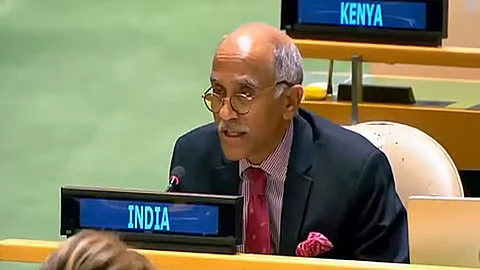

United Nations | Voicing concern over the persisting humanitarian crisis in Gaza, India asserted that a ceasefire must be put in place, emphasising that “intermittent pauses in hostilities” are "not enough" to address the scale of challenges facing the region's people.
“Today's meeting takes place against the backdrop of a persisting humanitarian crisis in Gaza," said India's Permanent Representative to the UN Ambassador Parvathaneni Harish, addressing an open debate in the UN Security Council on Wednesday.
"Intermittent pauses in hostilities are not enough to address the scale of humanitarian challenges confronting the people, who grapple daily with acute shortages of food and fuel, inadequate medical services and lack of access to education,” Harish said at the open debate on the 'Situation in the Middle East, including the Palestinian question'.
Underlining that the way ahead is clear, and highlighting India's consistent position in this regard, Harish said the ongoing human suffering must not be allowed to continue.
“Humanitarian assistance needs to be facilitated in a safe, sustained and timely manner. There is no substitute to peace. A ceasefire must be put in place. All hostages must be released. Dialogue and diplomacy remain the only viable paths to achieving these objectives. There are no other fixes or solutions,” he said.
He also expressed hope that an upcoming UN conference on the Israel-Palestine conflict would pave the way for “concrete steps" towards achieving a two-State solution.
Harish told the Council debate, held under Pakistan's presidency of the Security Council for the month of July, that India shares historic and strong ties with its Palestinian brothers and sisters.
“We have always stood by them and our commitment towards the Palestinian cause is unwavering,” he said, noting that India was the first non-Arab country to recognise the State of Palestine.
Describing the health and education situation in Gaza as “particularly troubling”, Harish said the World Health Organisation estimates that around 95 per cent of all hospitals in Gaza are damaged or destroyed.
The Office of the High Commissioner for Human Rights reports that more than 650,000 children have had no schooling for over 20 months, he said.
Harish said that India takes note of the High-Level International Conference on the implementation of a two-State solution scheduled for July 28-30.
“While engaging in a forward-leaning and constructive manner, it is our hope that this conference would pave the way for concrete steps towards achieving a two-State solution,” Harish said.
He said India underscores its readiness to contribute to efforts aimed at shaping a political horizon that restores hope for the Palestinians and achieving sustained peace in the Middle East.
The high-level conference, co-chaired by Saudi Arabia and France, was scheduled to take place from June 17-20 but was postponed due to escalating tensions in the region.
UN Secretary General Antonio Guterres has stressed that it is essential to keep alive the two-State solution perspective “with all the terrible things we are witnessing in Gaza and the West Bank.
“And for those that doubt about the two-state solution, I ask: What is the alternative? Is it a one-state solution in which either the Palestinians are expelled or the Palestinians will be forced to live in their land without rights? That would be totally unacceptable. I firmly believe that it is the duty of the international community to keep the two-State solution alive and then to materialise the conditions to make it happen,” he had said.
President of the General Assembly Philemon Yang has described the international conference as a crucial opportunity that “we must seize to chart an irreversible path towards the implementation of the two-State solution. It is imperative that this conference succeeds.” India reiterated that the pathway to enduring peace is rooted in a two-State solution - one that establishes a sovereign, viable and independent State of Palestine within recognised and mutually agreed borders, living side by side with Israel in peace.
India's endeavour is to make a “tangible impact” on the daily lives of the Palestinians by implementing projects in diverse sectors, and the country is currently implementing projects valued at more than USD 40 million, Harish said.
